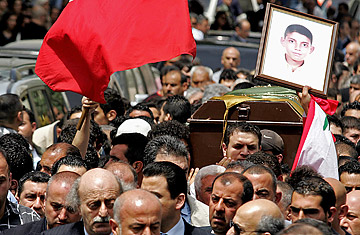
The funeral procession of 12-year-old Lebanese boy Ziad Ghandour and his friend Ziad Kabalan, 25, in Beirut, Lebanon, April 27, 2007.
Much of Beirut was on lockdown Friday, a scene all too familiar in recent months, with schools and universities closed and hundreds of riot police and soldiers in armored vehicles stationed on street corners. In the Sunni neighborhood of Qasqas, hundreds of Sunni and Druze mourners converged on the Kashikji mosque for the funeral of the two victims.
Ghandour and Qabalan had gone missing on Monday, their abandoned car found later in the suburb of Shiyeh. Their disappearance — an ominous echo of the kidnappings and murders of the 1975-1990 civil war — triggered a massive police manhunt. The Ghandour and Qabalan families are both connected to the political party of Walid Jumblatt, leader of Lebanon's Druze community and arch-foe of the militant Shi'ite Hizballah. And Lebanese long accustomed to a tradition of clan blood feuds immediately drew attention to the grievance of the Shamas family, a tough Shi'ite clan originally from a village in the Bekaa Valley in eastern Lebanon, some of whom live in the Ouzai slum quarter of southern Beirut. The Shamas clan lost one of its own, 29-year-old Adnan Shamas, in a sectarian riot in Beirut in January, and his brothers had subsequently told friends that they suspected members of Jumblatt's party were responsible, and had vowed revenge. The assumption that they were responsible was so widespread that the Shamas clan released a statement denying involvement in the death of the two Sunnis. Lebanon's defense minister has said that there are three suspects in the murder, and that their identities are "well known."
"The Shamas family went crazy with Adnan's death. I don't think it's over," said a friend of the Shamas clan who gave his name only as Jawad. Since Monday, friends say, some of the Shamas brothers have switched off their cell phones and gone into hiding. The uncompromising Bekaa clans are notoriously determined in matters of honor and revenge, which is why Hizballah leader Sheikh Hassan Nasrallah took the unusual step of twice emerging from hiding to deliver personal pleas for restraint to the Shamas family. Hizballah is deeply worried that the political crisis created by the standoff between the opposition bloc that it leads and the Western-backed government is aggravating sectarian tensions.
But whoever killed Ghandour and Qabalan paid no heed to the respected Hizballah's leader's entreaties.
Politicians from both sides of the divide have condemned the killings and called for calm. Jumblatt made a televised statement, saying that the murders should not be politicized and that solving the crime must be left to the state. Certainly, at the funeral for the two victims, mourners vowed to heed their leaders' calls. But the true sentiment of the crowd was revealed as the coffins were carried on a sea of upturned palms from the mosque to the adjacent cemetery. "Don't worry, Ziad, your blood will not be spilled in vain," they chanted, and "There is no God but God, and Nasrallah is the enemy of God."
"I hope we see Nasrallah's body next," said one young man to his friend as they walked out of the mosque behind the coffins. "God willing," his friend replied.
The mood in the Shi'ite-dominated southern suburbs of Beirut is equally toxic. Here, young men grumble at the constraints imposed on them by Nasrallah. "Hizballah keeps telling us to be calm and that they don't want a war. But we are tired of Sunni insults," said Ali Hijazi, 22, a mechanic. Lebanon has been gripped in political deadlock for almost five months with neither the opposition nor the government showing any willingness to yield to the other side's demands. Yet for all the bitterness generated by the crisis, there is little appetite for a return to the sectarian bloodshed that destroyed the country between 1975 and 1990. The January riot that left several people dead and led to a nighttime curfew served as a wake-up call to Lebanese politicians of the heated emotions in their respective communities. This week's double murder even led to an unexpected reconciliatory phone call between Nasrallah and Jumblatt, who have been at loggerheads for months. An encouraging sign perhaps, but it may have come too late to soothe the seething passions on the streets.
